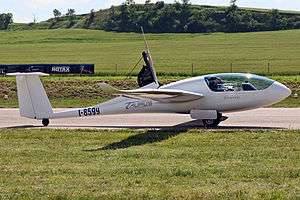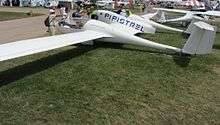Pipistrel Taurus
| Taurus | |
|---|---|
 | |
| Role | Self-launching sailplane |
| National origin | Slovenia |
| Manufacturer | Pipistrel |
| First flight | 2002 |
The Pipistrel Taurus is a Slovenian self-launched two-seat microlight glider designed and built by Pipistrel.[1][2][3]
Development
Developed by Pipistrel as one of the first self-launched glider in the microlight category the design used the wings of the Pipistrel Sinus with a new two-seat side-by-side fuselage.[1] To enable the Taurus to self-launch a pop-out propeller is mounted on the rear fuselage driven by a Rotax 503 piston engine.[1] In 2007 the company developed the Taurus Electro with the piston engine replaced by a permanent magnet synchronous three-phase brushless motor.[2][4]
Variants
- Taurus 503
- Variant powered by Rotax 503 pop-up piston-engine.[2][3]
- Taurus Electro
- Variant with a Sinedon 40 hp (30 kW) electric motor replacing the piston engine; first flown in 2007. It was the first electric motor glider to achieve series production.[2][3][4]
- Taurus PUREGLIDER
- Unpowered variant without engine fitted.
- Taurus Electro G2
- Introduced in February 2011 as a two-seat self-launching sailplane, powered by a 40 kW (54 hp) engine and lithium batteries. Powered endurance is 17 minutes, intending to allow for self-launching[5] to an altitude of 2000 m (6500 ft),[6] after which the engine is retracted and the aircraft then soars as a sailplane.

Taurus G4 on display
- Taurus G4
- One-off twin fuselage, four seat version, based on the Taurus Electro and acting as an engine development test bed for their forthcoming Panthera four seat hybrid. It has a 150 kW (201 hp) motor mounted on the central wing section between the fuselages. With two people on board, it was the winner of the Green Flight Challenge held in September 2011, covering 403.5 passenger miles per gallon gasoline equivalent and receiving the $1.35 million prize donated by NASA.[7]
Specifications
Data from [8]
General characteristics
- Crew: 2
- Length: 7.27 m (23 ft 10 in)
- Wingspan: 14.97 m (49 ft 1 in)
- Height: 1.41 m (4 ft 8 in)
- Wing area: 12.33 m2 (132.7 sq ft)
- Aspect ratio: 18.6
- Empty weight: 285 kg (628 lb)
- Max takeoff weight: 450 kg (992 lb)
- Powerplant: 1 × Rotax 503 piston engine, 40 kW (54 hp)
- Propellers: 2-bladed, 1.6 m (5 ft 3 in) diameter
Performance
- Maximum speed: 130 km/h (81 mph; 70 kn) with flaps extended
- Stall speed: 63 km/h (39 mph; 34 kn) with flaps
- Never exceed speed: 225 km/h (140 mph; 121 kn)
- Maximum glide ratio: 41:1
- Rate of sink: 0.7 m/s (140 ft/min)
See also
- Related lists
References
Notes
- 1 2 3 "World Directory of Leisure Aviation 2004/2005". Pagefast Ltd, England. 2004: 156. ISSN 1368-485X.
- 1 2 3 4 Vandermeullen, Richard: 2012 Kit Aircraft Buyer's Guide, Kitplanes, Volume 28, Number 12, December 2011, page 65. Belvoir Publications. ISSN 0891-1851
- 1 2 3 Bayerl, Robby; Martin Berkemeier; et al: World Directory of Leisure Aviation 2011-12, page 136. WDLA UK, Lancaster UK, 2011. ISSN 1368-485X
- 1 2 "Pipistrel - Taurus Electro is flying". Pipistrel. Retrieved 2009-12-26.
- ↑ Grady, Mary (February 2011). "Pipistrel Launches Electric Motorglider". AvWeb. Retrieved 17 February 2011.
- ↑ "Pipistrel Taurus Electro - Overview". Retrieved 29 March 2011.
- ↑ "Those magnificent men in their green flying machines". Pilot: 28. January 2012.
- ↑ "Pipistrel Taurus - Technical Data". Pipistrel. Retrieved 2009-12-26.
External links
| Wikimedia Commons has media related to Pipistrel Taurus. |
This article is issued from
Wikipedia.
The text is licensed under Creative Commons - Attribution - Sharealike.
Additional terms may apply for the media files.